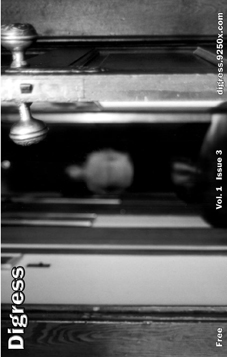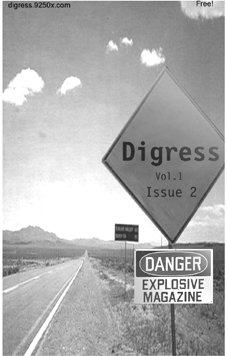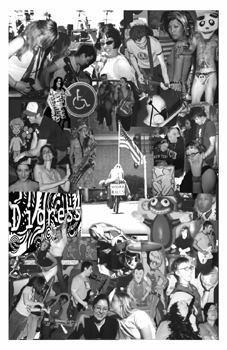
 |
| Digress Magazine and Queer Zinesters Have Lives Too |
|
I have known Annie quite a while now and realized that we haven't done an interiew yet! So it was time to ask her some questions.... Enjoy and check out her web site! elke
|
|
Can you tell me first of all a little bit about yourself? How old are you, where are you originally from and where do you reside now? I was born in Riverside and lived across the street from an elementary school where me and my little sister played and got into pod-throwing fights with the other neighborhood kids. Although I’ve lived in some other places for short periods of time, I am back in Riverside until I finish school. What do you do besides your zine? I’m working towards my Masters in Library and Information Science (MLIS), attending classes at Cal State Fullerton, dancing in the Rambling Roses Burlesque Troupe, volunteering for various local organizations and non-profits, making wire sculpture, writing memoirs and poetry, and publishing my zine, Digress (www.digressonline.com). |
|
|
|
Can you please tell our readers what your zines Digress and Queer Zinesters Have Lives Too are about? Digress is a print zine (although the first four issues are archived online at www.digressonline.com/archive) based in Riverside, California and features art and artists from surrounding communities (I use the term “artist” loosely as to me it includes musicians, writers, activists, and anyone else who considers what they do to be art.). It features the works of local artists along with interviews regarding their artistic process. Digress’ title speaks for itself. You never know what you may find in the next issue. |
Queer Zinesters Have Lives Too (http://www.digressonline.com/lgbtplus/) came about when I was taking an LGBT studies class wherein the final project consisted of developing a web site. After discussing with the professor my interest in becoming a librarian, she enabled me to fuse this newfound interest with my passion for zines and publishing by suggesting that I create a site serving as a mini library for some of my favorite queer zines. Creating the site “Queer Zinesters Have Lives Too” made me realize the difficulty in deciding how to organize the unpredictable and widely varying zines. Although this is nothing I will figure out even in the near future, I learned through this project that I wanted to play an active role in either creating or building on a larger zine collection. Soon thereafter, I decided to enroll in San Jose State University’s MLIS program. For how long have you been running these zines now and how many issues are there of Digress? There will be seven issues of Digress by the end of this summer. The first issue was published in the fall of 2002. Queer Zinesters Have Lives Too has been online for about four years now, and I plan to update and expand it when I complete grad school. However, I’m always looking to post new zines to the site! What made you decide to start these projects? How did you come up with the idea for Digress and Queer Zinesters Have Lives Too and the two names ? |
|
The idea to put out Digress came after editing for Cal State San Bernardino’s literary magazine, The Pacific Review. This position made me realize that I wanted to create a free space for artists (including writers, musicians, and activists—I see all of these as artistic endeavors), to promote their work and ideas. Subsequently, I’m hoping this inspires readers to be more self-actualized in their own artistic pursuits. What was your first exposure to zines? How did you find out about them? I learned about zines in my late teens when I found a few at local record stores (although I think it wasn’t a couple years later that I became obsessed with them!). I remember thinking how ballsy it was for someone to print any words or images they wanted to (original or borrowed, unedited, and uncut), there for anyone to read. |
 |
I love the freedom zines afford. With zines you’re not tied to any standard publishing or editing guidelines sought after by most commercial print media. What are some of the zines you read and admire? Clit Rocket, Yellow Three, Bitch King, Tongue Tied, Stolen Sharpie Revolution (a definite must for anyone new to zines or those curious as to what zines are), Bitch, Punk Planet, and Clamor (just to name a few). What advice would you give to someone who wanted to start a zine? Start putting your thoughts and visions on paper, whether they be expressed through words, images, or both. |
|
 |
Do you feel part of a (grrrl or general) zine community or network and what does it mean to you? I definitely feel part of zine communities, whether they be virtual or friends that I actually see on more of a regular basis. It is so important for me to keep in contact and/or hang with my fellow zinesters as they provide me with inspiration for my zine making. Not to mention, they’re usually putting on cool events and get-togethers such as zine workshops and benefit shows for their zines or other artists they’re helping promote. These happenings are always great opportunities to meet new zinesters and actively shape the community into a place you’re proud to be a part of.
|
The Internet is a great networking and research tool for me from writing my poetry to researching for school to creating my zines (however, the librarian in me wants to remind all you kiddies out there to critically analyze your Internet sources!). You are also involved in the West Coast Zine Archive at San Diego State University and are currently building a zine database. Why do you think it’s so important to collect zines in libraries and what are your visions in respect to preserving and archiving zines for future generations? Zines are incredible primary information sources for underserved individuals and groups, researchers, children, young adults, and the public overall. Personally, as a teenager struggling with identity issues, specifically those issues pertaining to gender and sexuality, zines were the only non-commercial format through which others like me spoke plainly and honestly in such a way that I didn’t have to struggle alone. Not to mention, my scope was widened by other perspectives I would not have been exposed to through popular teen magazines and media outlets. Therefore, it is imperative that resources like zines continue to be provided to all in the most open and non-discriminating manner possible by library institutions.
|
|
Do you define yourself as a feminist? Definitely. What are the most pressing issues you are confronted with in daily life (as a woman/feminist/femme…)? Issues of gender, specifically gender discrimination, the utter shortsightedness of our binary gender system, and people’s apathy to take back their communities and government. Many thanks for the interview, Annie!
|
 |